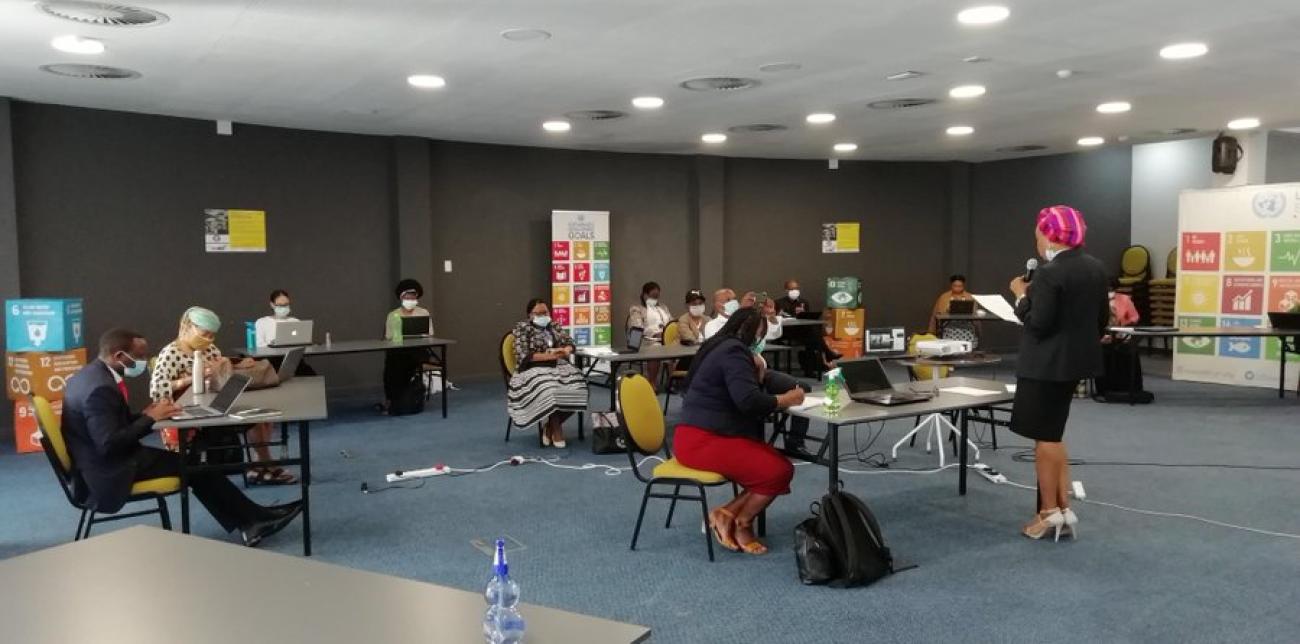The Annual UNCT Retreat 2020 Commences to Advance Agenda 2030 in Eswatini

Members of the UNCT commenced the Annual Retreat to consider critical issues affecting Emaswati, strengthen the UN team and ultimately advance Agenda 2030.
Members of the UNCT in Eswatini met to commence the Annual Retreat to consider critical issues affecting Emaswati, strengthen the UN team and ultimately advance Agenda 2030 in Eswatini.
On Wednesday, 22nd April 2020, the UN Country Team (UNCT) gathered for the UNCT Annual Retreat in the United Nations House in Eswatini, as One UN family, to carefully consider the critical issues that affect Emaswati, including: health, education, food security, economy, climate change, governance, human rights, protection of vulnerable groups.
The Annual Retreat is set to take place intermittently over the next fortnight and aims to strengthen the UN team and the UN’s Delivery as One approach; enhance the visibility of the UN’s presence in Eswatini, making the organisation more relevant than ever before; and enhance and build more strategic partnerships while advancing Agenda 2030 of SDGs in Eswatini.
The Retreat is taking place under different circumstances this year, in consideration of COVID-19; circumstances which are unprecedented in the 75 year history of the United Nations. Facilitated by Ms Marjorie Mavuso, colleagues joined the meeting on Zoom, from their homes in Eswatini and South Africa.
The UN Resident Coordinator, Ms Nathalie Ndongo-Seh, addressed the UNCT and opened the meeting, saying; “It is with great pleasure and a sense of relief that I see all of you and welcome all of you to this year’s UNCT Retreat, which is being held under difficult circumstances unprecedented in the 75 year history of the United Nations,”
Our meeting today, and over the next few days, is a clear demonstration of our resolve to ensure the continuity of UN operations and performance of key functions under our One UN BCP; and our commitment to support the Government and the people of Eswatini today, this year and throughout the cycle 2021-2025.”
The UN Resident Coordinator remarked that the COVID-19 pandemic gives the UN, “an opportunity to strengthen to strengthen our [the] Delivering as One (DaO) approach by being guided by a collaborative mindset, by recommitting to working together, and by pledging to discard any silo approach to work.”
2020 marks the final retreat in the UN Developmental Framework (UNDAF) 2016-2020. The new UN Development and Cooperation Framework (UNSDCF) for the period of 2021-2025 is expected to be signed in July this year. The UNSDCF represents the UN’s collective offer to support Eswatini in addressing key priorities and gaps in the implementation of the SDGs. The UNCT therefore are using their time to formulate strategic priorities and outcomes, whilst looking at comparative advantages and complementarity with partners, and establishing the status of SDG implementation in Eswatini.
The UN Resident Coordinator stated that; “Our strategic prioritization process will be guided by national priorities as outlined in the National Development Plan (NDP) and the Government Strategic Roadmap. We have invited the Ministry of Economic Planning and Development (MEPD) to provide an overview of Eswatini’s development landscape, including progress made in the implementation of the SDGs. We will warmly welcome Make Phindile Masango, Senior Economist at MEPD, who will share with us such important developments and possibly updates on the socio-economic front,”
“The SDGs remain our overall shared agenda and we want to use this retreat to chart a clear pathway towards achieving the 2030 targets. Despite the threat of COVID-19, this is still a Decade of Action around the world and we must continue to accelerate efforts towards achieving our goals.”
Members of the UNCT will work towards finalising and adopting the UNCT Workplan for 2020 throughout the Retreat. Accountability was highlighted by the UN Resident Coordinator, who ended her statement, saying; “We will conclude this retreat on a reminder of the Management and Accountability Framework (MAF) provides a clear, unambiguous framework for management and accountability within UN Country Team, in a way that remains faithful to the letter and spirit of the General Assembly resolution on the repositioning of the UN development system.”
Members of the UNCT presented their key successes, challenges and gaps which need to be identified in the implementation of the SDGs in Eswatini. Dr Alice Akunga, Resident Representative of UNICEF, noted that there is a need to address the populations which are left behind across human development. Agenda 2030 strives to ensure that nobody is left behind in the implementation of the SDGs, and therefore, the UNCT in Eswatini is determined to prioiritise and strategise with vulnerable populations at the core of the UN’s work.
The UNCT will re-convene tomorrow at the UN House at 8:30am for the second day of the Annual Retreat.

















